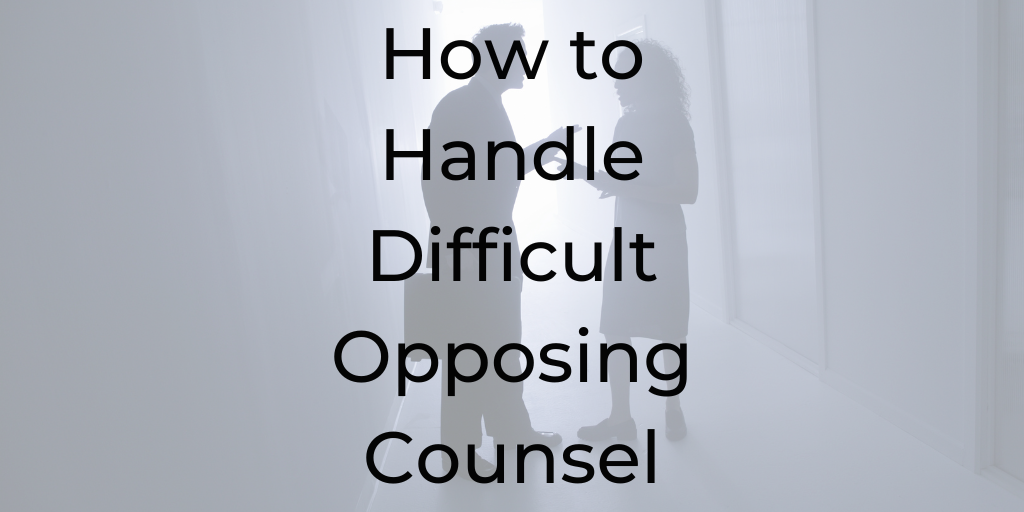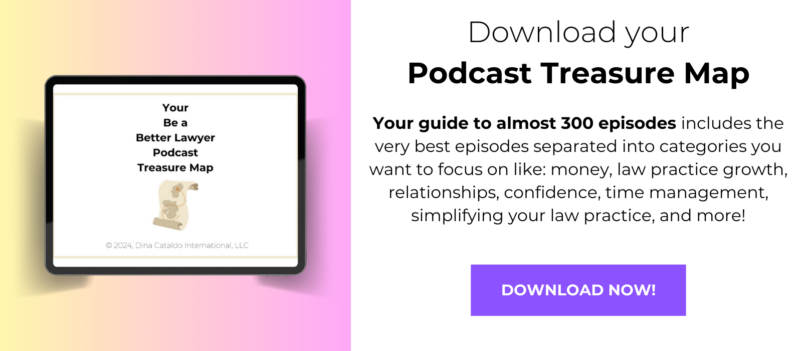Have you ever received an email from an opposing counsel and felt your chest tighten?
Or dreaded going into court because you knew opposing counsel was going to say or do something you considered unethical or devious?
Just about every lawyer has experienced this.
Not addressing the problem can cause procrastination, rumination, time-waster, and even losing sleep after interactions with a single opposing counsel.
We also can’t think as clearly, so simple solutions to problems are harder for our brain to find.
We can begin to think we’re not cut out for the law or litigation and doubt our abilities.
If we don’t know the root cause of these feelings, we can believe it’s the opposing counsel that’s causing them.
That’s a lot of power to give to someone on the other side of counsel table.
In this episode of Be a Better Lawyer Podcast, learn how to handle difficult opposing counsel in a way that puts you in the driver's seat.
RESOURCES
- BBL #297: What Clients Think About You
- Book a Strategy Session to work with me 1:1
- Connect on Instagram
- Connect on Linked In
NEW TO THE PODCAST?
LOVING THE PODCAST? SHARE THE LOVE!
- Share it with friends, that lawyer you just met at a networking event, or on social media. (Be sure to tag me on social, so I can say thanks!)
- Subscribe to Be a Better Lawyer free on Spotify and Amazon Music or subscribe on Apple Podcasts and Stitcher.
- Leave a review.
Thanks for listening and supporting Be a Better Lawyer Podcast.
Your support means the world to me and allows the work I'm doing here to reach more lawyers.
I truly believe the more lawyers we can positively impact with coaching, the brighter our future as a planet will be.
Talk to you next week.
How to Handle Difficult Opposing Counsel
Have you ever received an email from an opposing counsel and felt your chest tighten?
Or dreaded going into court because you knew opposing counsel was going to say or do something you considered unethical or devious?
If you have, know that I’ve been there too.
And just about all of my clients have too.
It can cause problems like procrastination, rumination, wasting time complaining to people about their behavior, over-drinking, over-eating, and losing sleep over interactions with a single opposing counsel. We also can’t think as clearly, so simple solutions to problems are harder for our brain to find.
We can begin to think we’re not cut out for the law or litigation and doubt our abilities.
If we don’t know the root cause of these feelings, we can believe it’s the opposing counsel that’s causing them. That if they only behaved differently or were nicer, then we would feel better.
Or that the only solution is to leave the law.
That’s a lot of power to give to someone on the other side of counsel table.
In this episode, I want to help you feel more powerful in your law practice and recognize that you have more power in these situations to manage your emotions and take care of business than you think.
I’m going to give you a couple examples of how to handle different opposing counsel behaviors and then I’m going to give you some questions to ask yourself for any particular situation with opposing counsel you’re in.
Over the 16 years that I was a criminal prosecutor, I experienced opposing counsel who:
- lied
- attempted to manipulate evidence
- Tried to rattle me
- Who were unhelpful
- insulted me in open court
- came up with random motions in the middle of a hearing
- would make up accusations seemingly from no where
Now I’d say about 97% of my interactions with opposing counsel were good interactions. I’m talking about the 2-3% of lawyers who use these kinds of tactics.
When I was a young attorney, I didn’t know how to handle these situations. I was confused as to why they would behave this way. I felt dread dealing with certain lawyers and anger too at what I perceived as unprofessional and unkind behavior.
But as time went by and as I was exposed to coaching, I recognized that they weren’t the problem.
I was the problem.
Because I was the one internalizing what they did or said and made meanings out of them.
Think about this.
Words come out of their mouth. We hear them. Our brain processes them. Then our brain makes a meaning out of them. It’s instantaneous. We don’t see it. So it becomes difficult for us to pause and see that we’re making an interpretation — often a wrong one — about the words we hear.
Our brain takes them personally because it’s super self-centered. It sees no other option than to take it personally.
When I stopped taking these things personally, it made my job so much easier. I became more understanding of what they were doing. I’m not saying I agreed with their tactics, but I could understand them.
These tactics had nothing to do with me. They had to do with their clients and what these attorneys thought it meant to do a good job for their clients’ interests.
An example I love giving is the email I received from an OC who — in my brain’s interpretation – wrote a rude letter. It was incredibly long, there were lots of bullet points, there was unnecessary demanding happening in the letter. I could feel anger rising up in my body. I was so indignant. But then I paused. And I asked myself who this email was for? Because it wasn’t for me. I’d talked to this attorney and we were both on the same page about how we thought this case would resolve. Giving myself that second helped me realize that this letter was for his client. He wasn’t his client to see him as a strong advocate for their position. That was it. Later on I confirmed my thoughts with him over a phone call.
That’s one example of misinterpreting an email, but what about those attorneys who — in our view — behave badly. And I’ve seen my share of them.
Here’s how I think about them:
We tend to believe that everyone thinks like us. And because I know who I attract to this podcast, I know that you’re a heart-centered lawyer who’s kind and considerate. You don’t throw around accusations or insult people in court. The most you probably do is roll your eyes.
That tendency to believe other people think like we do is called cognitive bias.
This came up recently in a call with a lawyer. They hated responding to a particular opposing counsel’s emails because she dreaded opening them because she was afraid she’d find an accusation of wrong doing, which he did fairly commonly.
When we talked through it, we looked at what she was making any accusation of wrong doing against her mean.
It turned out she was making it mean that she had actually done something wrong. Her brain just believed what the opposing counsel said.
If she took a moment, she knew she was in the right and hadn’t done anything wrong, but her brain’s first reaction was to believe it.
And I believe that our cognitive bias is at play here too because we would never accuse anyone of wrong doing unless it was true. So our brain can’t believe that someone else would do that unless it was true.
Once we know this tendency of our brain, it can take the sting out of interactions with opposing counsel and allow us to think more clearly.
Another client of mine had a trial with an opposing counsel who would yell at her and raise his voice in court. We coached on her initial feelings of dread around these interactions, and just having that awareness that his yelling had nothing to do with her transformed her in court. She decided she wanted to be calm and reasonable in the court. She let him yell and argue, and she would calmly state the facts to the judge. When they were before the jury, her cool demeanor swayed them over the opposing counsel’s antics.
Just hearing this story, why do you think that opposing counsel was acting the way he did? You might think he did it just because he was a jerk. But the real reason is because he didn’t have a leg to stand on in his case. He had bad facts, and he knew it. He was furious that my client was calm because the only tool he had in his toolbox was trying to rattle her, and that wasn’t working.
When I think about the behavior I’d label as “bad” by opposing counsel over the years, I don’t think of them as bad people.
Here’s how I think about it:
They were simply behaving in a way they thought they needed to represent their client. Or they had low self-esteem. Or they were afraid of losing a case. Or they were trying to impress a client who was in court, or they lacked the confidence to admit when they were wrong.
Once I decide that their behavior has nothing to do with me, I’m free to decide deliberately how I want to show up in the relationship instead of reacting with anger.
How they were behaving didn’t mean anything about me.
It didn’t mean I had to like them or grab a drink with them after court.
But it did mean that I had a choice to allow them to rattle me or decide they must know I have the upper hand.
Here’s a few questions to ask yourself if you’re thinking about a particular opposing counsel as we’ve talked about this topic:
Get out a pen and notepad.
1) Write down all your judgments about this person. Don’t hold back.
2) Go back through the list and notice how many of these judgments you have about yourself. A lot of times our judgments of other people are projections we have of what we believe about ourselves.
3) How do you want them to behave? In your ideal world, how do they talk to you? How do they behave in court? On the phone?
4) Read through what you wrote in number 3 and ask yourself what you’d be thinking and feeling if they did all these things?
Notice that you’re making them responsible for how you feel. You can actually think and feel these things anyway.
5) Now ask yourself, if you’re just looking at who they are and how they behave, what can you expect from them? You know that they’re going to say and do certain things. They’re not going to change. What are they?
6) Why do you think this person does what they do? What thoughts do you imagine are driving them to behave the way they do?
7) Who do you want to be in this relationship? Think about how you WANT to be. Don’t let their behavior determine how you show up.
Come back to this episode any time you notice that you feel frustrated with an opposing counsel because it will remind you that you get to choose who you are in relationship with opposing counsel no matter how they behave.
And if you want to take what you’re learning in this podcast and put it into practice to love your life and law practice, let’s work together.
Coaching is a tool pro athletes and top tier entrepreneurs use to become top performers while reducing stress. Because we can’t be top performers while feeling stressed out and overwhelmed. It’s a tool you can use to do the same thing.
You can book a call with me at dinacataldo.com/strategysession
Remember: what you want matters, and it’s within your power to make it happen.




